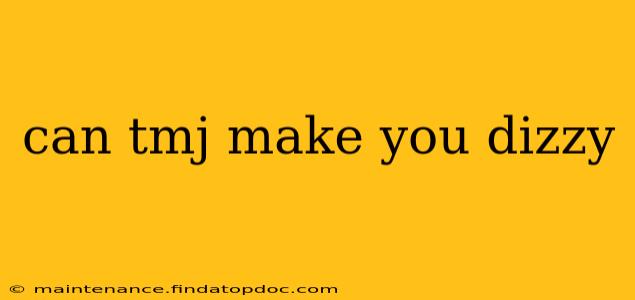Temporomandibular joint (TMJ) disorders are a common source of facial pain and discomfort, but did you know they can also cause dizziness? The connection might seem unexpected, but the intricate network of nerves and muscles in the head and neck means that TMJ problems can trigger a cascade of symptoms, including dizziness, vertigo, and imbalance. This article explores the relationship between TMJ and dizziness, answering common questions and providing insights into diagnosis and treatment.
How Can TMJ Cause Dizziness?
The link between TMJ and dizziness isn't always straightforward, but several mechanisms can contribute:
-
Muscle Tension and Headaches: TMJ disorders often involve significant muscle tension in the jaw, neck, and shoulders. This tension can lead to tension headaches, which are a well-known trigger for dizziness. The pain and constriction can affect blood flow and nerve function, contributing to feelings of lightheadedness or vertigo.
-
Nerve Irritation: The trigeminal nerve, a major nerve in the face, is closely associated with the TMJ. Irritation or compression of this nerve due to TMJ dysfunction can cause referred pain and symptoms in other areas, including the inner ear, leading to dizziness.
-
Inner Ear Problems: While not directly caused by TMJ, the constant muscle tension and headaches associated with TMJ can exacerbate pre-existing inner ear conditions, making dizziness worse. This is particularly true for individuals with vestibular disorders.
-
Postural Issues: Chronic jaw pain can lead to changes in posture, including forward head posture. This altered posture can affect the balance mechanisms in the inner ear and contribute to dizziness.
-
Psychological Factors: The chronic pain and frustration associated with TMJ can contribute to stress and anxiety, which are known to exacerbate dizziness and other symptoms.
What are the Symptoms of TMJ-Related Dizziness?
The dizziness associated with TMJ can manifest in various ways, including:
- Lightheadedness: A general feeling of faintness or unsteadiness.
- Vertigo: A sensation of spinning or room movement.
- Imbalance: Difficulty maintaining balance or coordination.
- Nausea: Often accompanies vertigo or severe dizziness.
- Headaches: Tension headaches or migraines are frequently associated with TMJ and dizziness.
Can TMJ Dizziness Be Treated?
Fortunately, TMJ-related dizziness is often treatable. Treatment strategies usually focus on addressing the underlying TMJ disorder. Common approaches include:
- Physical Therapy: Exercises to improve jaw mobility, reduce muscle tension, and improve posture.
- Medications: Pain relievers, muscle relaxants, or anti-inflammatory drugs to manage pain and inflammation.
- Splints or Mouthguards: To help realign the jaw and reduce stress on the TMJ.
- Lifestyle Changes: Stress reduction techniques, improved posture, and dietary modifications (avoiding hard foods).
- Injections: Corticosteroid injections can help reduce inflammation in the TMJ.
- Surgery: In rare cases, surgery may be necessary to correct severe TMJ problems.
How is TMJ-Related Dizziness Diagnosed?
Diagnosing TMJ-related dizziness requires a thorough evaluation by a healthcare professional, ideally a specialist familiar with both TMJ disorders and vestibular problems. The diagnosis typically involves:
- Physical Examination: To assess jaw range of motion, muscle tenderness, and overall posture.
- Imaging Studies: X-rays, MRI, or CT scans may be used to visualize the TMJ and rule out other conditions.
- Vestibular Testing: To assess the function of the inner ear and its role in balance.
- Neurological Exam: To rule out other neurological causes of dizziness.
Does everyone with TMJ experience dizziness?
No, not everyone with TMJ experiences dizziness. The presence of dizziness depends on several factors, including the severity of the TMJ disorder, individual susceptibility, and the presence of other underlying health conditions.
How long does dizziness from TMJ last?
The duration of dizziness from TMJ varies depending on the severity of the condition and the effectiveness of treatment. In some cases, dizziness may resolve relatively quickly with conservative treatment, while in others, it may persist for a longer period.
What specialists should I see if I think my dizziness is related to TMJ?
You should consult with your primary care physician initially. They can perform a preliminary examination and then refer you to specialists as needed. These specialists might include an oral surgeon, a dentist specializing in TMJ disorders, a physiatrist, a neurologist, or an otolaryngologist (ENT doctor).
By addressing the underlying TMJ problem, you can often alleviate the associated dizziness and improve your overall well-being. If you are experiencing dizziness and suspect a link to your TMJ, seeking professional medical attention is crucial for accurate diagnosis and effective treatment. Remember, this information is for educational purposes only and should not be considered medical advice. Always consult with a healthcare professional for any health concerns.
